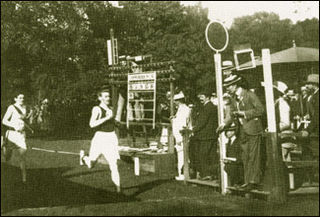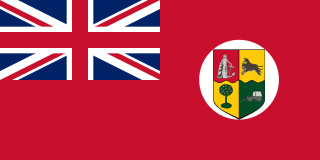
Bevil Gordon D'Urban Rudd was a South African athlete, the 1920 Olympic Champion in the 400 metres.

The men's 800 metres at the 2004 Summer Olympics as part of the athletics program was held at the Athens Olympic Stadium from August 25 to 28. Seventy-two athletes from 58 nations competed. The event was won by 0.16 seconds by Yuriy Borzakovskiy of Russia, the first medal for the nation in the event. Wilson Kipketer of Denmark became the 10th man to win a second medal in the 800 metres.
The men's 800 metres made its fourth Olympic appearance at the 1908 Summer Olympics. The competition was held on July 20, 1908, and on July 21, 1908. The races were held on a track of 536.45 metres=1⁄3 mile in circumference. It was run in two rounds, with the winners of the eight heats of the first round competing in the final.
The men's 1500 metres was an Olympic event for the fourth time at the 1908 Summer Olympics. The competition was held on 13 and 14 July 1908. The races were held on a track of 536.45 metres=1⁄3 mile in circumference. The event was won by Mel Sheppard of the United States, the second consecutive Games an American had won the event. Sheppard, like Jim Lightbody in 1904, would also win the 800 metres for a middle-distance double.

The men's 800 metres was middle-distance running event on the athletics programme at the 1900 Summer Olympics in Paris. It was held on July 14 and July 16, 1900. The races were held on a track of 500 metres in circumference. 18 athletes from seven nations competed. The event was won by Alfred Tysoe of Great Britain, the nation's first medal in the event. The United States also won its first medals in the 800 metres, with silver and bronze.
The men's 800 metres was the middle of the seven men's track races in the Athletics at the 1964 Summer Olympics program in Tokyo. 47 athletes from 32 nations competed. The maximum number of athletes per nation had been set at 3 since the 1930 Olympic Congress. The first round was held on 14 October, with the semifinals on 15 October and the final on 16 October. The event was won by Peter Snell of New Zealand, successfully defending his 1960 gold medal, and completing the first half of his 800 metres/1500 metres double. Bill Crothers of Canada took silver, the first 800 metres medal for that nation since 1936 and matching Canada's best-ever result in the event. Wilson Kiprugut's bronze was the first medal by Kenya in any event; Kenya would become a frequent fixture on the men's 800 metres podium.

The men's 1500 metres was the third-longest of the seven men's track races in the Athletics at the 1964 Summer Olympics program in Tokyo. It was held on 17 October, 19 October, and 21 October 1964. 50 athletes from 34 nations entered, with 7 not starting the first round. The maximum number of athletes per nation had been set at 3 since the 1930 Olympic Congress. The first round was held on 17 October, with the semifinals on 19 October and the final on 21 October.

The men's 200 metres was a track and field athletics event held as part of the Athletics at the 1912 Summer Olympics programme. It was the fourth appearance of the event, which has appeared at every edition of the Summer Olympics since the 1900 Summer Olympics. The competition was held on July 10, 1912, and on July 11, 1912. 61 runners from 19 nations competed. NOCs could enter up to 12 athletes. The event was won by Ralph Craig of the United States, the nation's third victory in four Games. Another American, Donald Lippincott, took silver. Great Britain earned its first medal in the 200 metres with Willie Applegarth's bronze.

The men's 800 metres was a track and field athletics event held as part of the athletics at the 1912 Summer Olympics programme. It was the fifth appearance of the event, which is one of 12 athletics events to have been held at every Summer Olympics. The competition was held from Saturday, July 6, 1912, to Monday, July 8, 1912. Forty-seven runners from 16 nations competed. NOCs could enter up to 12 athletes. The event was won by Ted Meredith of the United States, the nation's third consecutive victory in the 800 metres. Mel Sheppard became the first man to win two medals in the event, coming in second to miss out on defending his 1908 gold. Ira Davenport completed the United States sweep, the second time the Americans had swept the 800 metres podium.

The Union of South Africa competed at the 1920 Summer Olympics in Antwerp, Belgium. 39 competitors, 38 men and 1 woman, took part in 34 events in 7 sports.
The men's 800 metres event at the 1956 Summer Olympics in Melbourne was held on 23, 24, and 26 November 1956. There were a total number of 38 competitors from 24 nations. The maximum number of athletes per nation had been set at 3 since the 1930 Olympic Congress. The event was won by Tom Courtney, the last of a streak of four American victories in the event and the seventh overall United States victory. Derek Johnson's silver put Great Britain back on the podium for the first time since that nation's own four-Games gold streak ended in 1932. Norway received its first men's 800 metres medal with Audun Boysen's bronze.
The men's 100 metres event was part of the athletics programme at the 1920 Summer Olympics. The competition was held on August 15 and 16, 1920. The event was won by Charley Paddock of the United States. Great Britain won its first medal in the event, a bronze by Harry Edward.

The men's 200 metres event was part of the track and field athletics programme at the 1920 Summer Olympics. The competition was held on Thursday, August 19, 1920, and on Friday, August 20, 1920. Forty-eight sprinters from 22 nations competed. Nations were limited to 4 athletes each, down from the 12 allowed in previous Games. The event was won by Allen Woodring of the United States, the nation's second consecutive victory in the event and fourth in five Games. Fellow American Charley Paddock took silver. Great Britain reached the podium for a second consecutive Games with Harry Edward's bronze.
The men's 400 metres event was part of the track and field athletics programme at the 1920 Summer Olympics. The competition was held on Thursday, August 19, 1920, and on Friday, August 20, 1920. 37 runners from 16 nations competed. No nation had more than 4 runners, suggesting the limit had been reduced from the 12 maximum in force in 1908 and 1912. The event was won by Bevil Rudd of South Africa, the nation's first title in the event. Nils Engdahl's bronze was Sweden's first medal in the 400 metres.
The men's 1500 metres event was part of the track and field athletics programme at the 1920 Summer Olympics. The competition was held on Wednesday, August 18, 1920, and on Thursday, August 19, 1920. Twenty-nine runners from 12 nations competed. No nation had more than 4 runners, suggesting the limit had been reduced from the 12 maximum in force in 1908 and 1912. The event was won by Albert Hill of Great Britain, completing his middle-distance double. It was the nation's second consecutive and third overall championship in the men's 1500 metres.
The men's 800 metres was an event at the 1992 Summer Olympics in Barcelona, Spain. There were a total number of 59 participating athletes from 48 nations, with eight qualifying heats. The maximum number of athletes per nation had been set at 3 since the 1930 Olympic Congress. The event was won by 0.04 seconds by William Tanui of Kenya, the second straight Games in which a Kenyan man won the 800 metres. Johnny Gray returned the United States to podium after a 16-year absence.
The men's 800 metres event was part of the track and field athletics programme at the 1924 Summer Olympics. The competition was held from Sunday, July 6, 1924, to Tuesday, July 8, 1924. As with all other races the track was 500 metres in circumference. Fifty middle distance runners from 24 nations competed.
The men's 400 metres event was part of the track and field athletics programme at the 1924 Summer Olympics. This race was depicted in the film Chariots of Fire. The competition was held on Thursday, July 10, 1924, and on Friday, July 11, 1924.
The men's 800 metre event at the 1928 Olympic Games took place between July 29 & July 31. Forty-nine athletes from 24 nations competed. NOCs were limited to 4 competitors each.

Edgar Donald Mountain was a British middle-distance runner, who competed at two Olympic Games.







